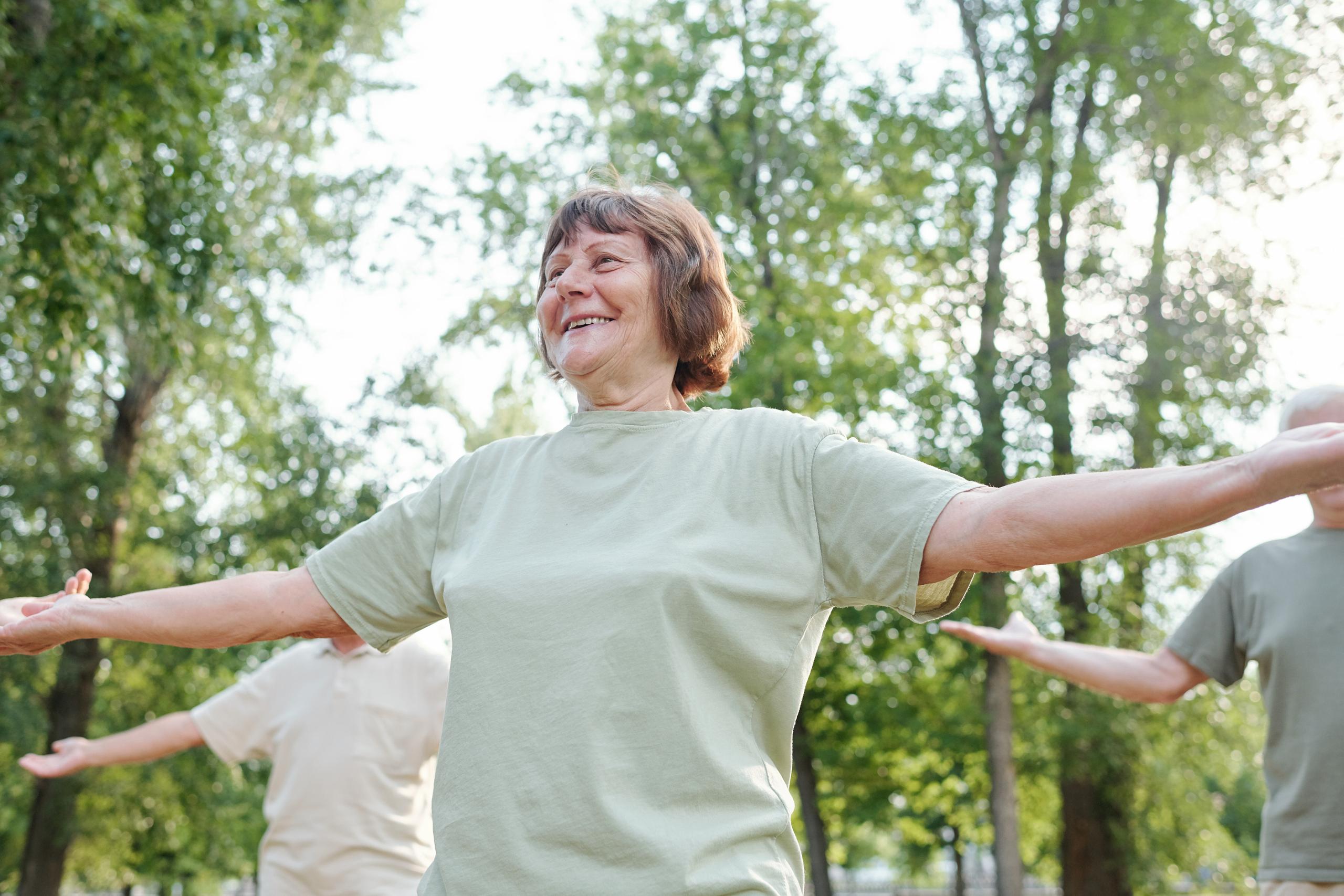The Power of Community: Finding Connection Through Qigong Classes
A common misconception of qigong is that it is a solitary practice, not least because a lot of the qigong videos online show just one person. And while practising on your own has the advantage of time and convenience, have you considered the benefits of group sessions?
Practising qigong with others can add a whole other dimension to it. In fact, there are many potential benefits: community and connection; motivation; a supportive environment for personal growth, health and wellbeing; enhancement of your qigong practice and the positive experience of synchronous movement. I cover those advantages in more detail below, so read on to find out more.
Community and Connection
You may think that there is limited opportunity for social interaction at a qigong class and that everyone is quietly focused on what they are doing the whole time, but that is not the case. Training with others involves interacting with the instructor, interacting with other students and more broadly feeling a sense of community.
Interacting with others in a class can involve catching up with each other before and after, sharing how we experience the movements during the class and laughing together. As one of my students says in her testimonial on my website:
“The small groups are lovely. We have a laugh, chats and generally try to help each other.”
As well as serving as a regular opportunity to meet up with existing friends and share a positive experience, a qigong class can also be a great way to make new friends and acquaintances by building connections with like-minded individuals.
I have certainly found qigong practitioners to be gentle, kind and supportive people, which really drew me to the practice. I have made some good new friends through it and a mutually supportive network, which is priceless. For example, through my own qigong teacher, I have found a meditation group to join, and through a student of mine, I have found a lovely yoga class within a short walk from home. What a wonderful ripple effect!
And of course, the camaraderie between individuals can enhance the perception of friendliness of the group as a whole. The overall sense of community and connection in a qigong class can help to foster positive feelings, such as empathy, acceptance, warmth, regard and genuineness. If you are shy by nature, the supportive atmosphere may encourage you out of your shell and help you to develop your social skills in a way that feels safe for you.
As Peter Wayne says in his book The Harvard Medical School Guide to Tai Chi “A strong body of research suggests that these forms of social support and sense of connection have huge, positive impacts on health, in terms of disease prevention, recovery rates, and remission following events such as heart attacks and cancer diagnosis. Simply stated, being and feeling connected to others makes you healthier and happier, and fosters a longer life.” I will explore the benefits to health and wellbeing next, along with the potential for personal development.
A Supportive Environment for Personal Growth, Health and Wellbeing
If you're anything like me, you like to know why, not just what. So, when I'm leading a qigong class, I like to weave the theory behind the movements into it. Understanding the purpose of each practice can enhance its effects because it keeps your mind focused and intentional, which is a key part of qigong.
I also share my knowledge of health and wellbeing in class where appropriate. A classic example is why good posture is so important and why we work on it in qigong. I have had more than one student tell that they have used the qigong meditation techniques from class to help them relax in the dentist’s chair!
And of course there are the other potential benefits of a regular qigong practice in everyday life: body awareness, efficiency of movement, injury prevention, good posture, better balance and co-ordination, strengthening muscles and bones, increased vital energy, improved concentration and relaxation. You can find out more about those in my previous blog post 10 Potential Health Benefits of Qigong.
It is a two-way process, and I learn from students too, for example how qigong benefits them or what else they might have found helpful in managing a particular health condition. And of course, students support each other through sharing their own experiences of qigong and particular practices.
Motivation
You may have the best of intentions to do qigong regularly, but it is easy to fall off the wagon when it comes to keeping ourselves accountable. Life gets in the way and you can end up putting yourself last, dropping self-care in place of the needs of others and the demands of life.
The beauty of practising with a group is the additional motivation you get - your qigong buddies can help keep you accountable, motivating you to turn up on a regular basis. It can also be an opportunity to support friends and acquaintances in improving their health and wellbeing by encouraging them to come along and join in, which is empowering for both parties.
In his research paper ‘The Sociology of Qi Gong’, Paul Posadzki explains that “the better the interpersonal relationships, the more engaged individuals are in enhancing their health and the better their prospects for future wellness and psychological health.”
How Social Connection Can Enhance Your Qigong Practice
In his research paper cited above, Paul Posadzki says that “beneficial, positive social experiences may in turn strengthen the physiological effects of Qi Gong exercises.” What a wonderful synergy that we can tap into!
For example, those physiological effects might include a calming effect on the nervous system, so a lower heart rate and blood pressure, and reduced anxiety, as reported by Chun-Yi Lin et al. in their research paper ‘Acute Physiological and Psychological Effects of Qigong Exercise in Older Practitioners.’ Also “a physiologic impact on immune system functioning and inflammatory responses,” as described by Byeongsang Oh et al. in ‘The Effects of Tai Chi and Qigong on Immune Responses: A Systematic Review and Meta-Analysis.’
Paul Posadzki also explains that “Qi Gong exercises are complicated sequences of sometimes hundreds of movements that may be more easily memorised thanks to others’ presence or help.” We can clearly see the opposite of that when we are trying to balance and start to wobble if we see someone else wobbling. The positive influences are perhaps less obvious, but are undoubtedly there, helping us to move slowly, smoothly and with grace in a qigong class. Synchronicity of movement comes into play here, so I cover that next.
The Benefits of Synchronous Movement
A qigong class involves moving together, often in time with each other. That synchronised movement is like dance: instinctive, natural and deeply nurturing. It can engender a sense of unity and common purpose. In his blog post ‘Social Benefits of Synchronization’ in Psychology Today, Shahram Heshmat explains in more depth how interpersonal synchrony can benefit interactions and wellbeing.
To summarise, practising qigong with others is holistic in that it benefits both mind and body through community, connection, motivation and support. Not only do you stand to benefit from the qigong itself, but also from the social connection of working in synchrony with a group, potentially enhancing the effect of the qigong, especially in terms of increased psychological wellbeing and immune function, and reduced stress and disease.
If you would like to experience the benefits of joining a qigong class and you are local to Reading in the UK, do get in touch by emailing wendy@rookeholistic.co.uk or call me on 07528 708650.
Sources:
The Harvard Medical School Guide to Tai Chi, Peter Wayne.
‘The Sociology of Qi Gong: A qualitative study,’ Paul Posadzki, Complementary Therapies in Medicine (2010) 18.
https://www.researchgate.net/publication/43354247_The_sociology_of_Qi_Gong_A_qualitative_study
‘Acute Physiological and Psychological Effects of Qigong Exercise in Older Practitioners,’ Chun-Yi Lin, Tze-Taur Wei, Chen-Chen Wang, Wan-Chen Chen, Yu-Min Wang and Song-Yen Tsai, Evid Based Complement Alternat Med. 2018: 4960978.
‘The Effects of Tai Chi and Qigong on Immune Responses: A Systematic Review and Meta-Analysis,’ Byeongsang Oh,Kyeore Bae, Gillian Lamoury, Thomas Eade, Frances Boyle, Brian Corless, Stephen Clarke, Albert Yeung, David Rosenthal, Lidia Schapira, and Michael Back.
Medicines (Basel). 2020 Jul; 7(7): 39. https://www.ncbi.nlm.nih.gov/pmc/articles/PMC7400467/
‘Social Benefits of Synchronization,’ Shahram Heshmat, Psychology Today, Dec 2021:
https://www.psychologytoday.com/gb/blog/science-choice/202112/social-benefits-synchronization

